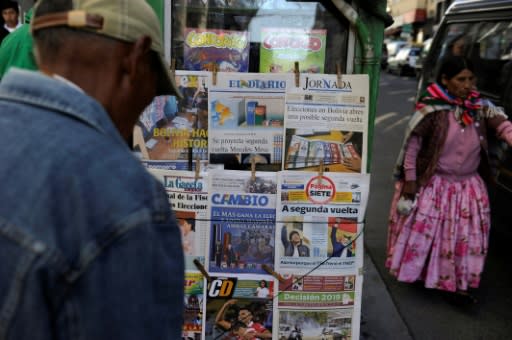Opposition and US voice concern over stalled Bolivia vote count
The main opposition candidate in Bolivia's presidential election Monday blasted unexplained delays in announcing the results and accused President Evo Morales of trying to avoid a second round run-off. Carlos Mesa, a former president who came a close second to Morales in Sunday's polls, accused the long-time incumbent of colluding with the electoral court to try to "eliminate a path to the second round." Partial results announced Sunday put Morales in the lead with 45 percent of the votes, with Mesa on 38 percent, meaning Morales -- controversially seeking a fourth term -- would have to contest a run-off for the first time. The United States also expressed concern, urging Bolivia to act immediately to ensure transparency in the vote count. Amid growing tension in La Paz, hundreds of supporters of Mesa and Morales faced off in the capital's Plaza Bolivia on Monday, separated by riot police. The electoral authority headquarters is located in a nearby hotel. - Vote count stuck - The top US diplomat for Latin America said that the United States was closely watching the election, including the abrupt stop in vote tabulation late Sunday. "Electoral authorities should immediately restore credibility and transparency to the process so that the will of the Bolivian people is respected," Michael Kozak, assistant secretary of state for Western Hemisphere affairs, wrote on Twitter. Morales, a former coca farmer and leftist union leader who has championed the impoverished nation's indigenous people, has had a rocky relationship with the United States, especially over Washington's bids to stop the drug trade. Official results remained stuck overnight at 84 percent of ballots counted, leading an observer mission of the Organization of American States (OAS) to ask for clarification. Since then, the electoral authority explained it was abandoning the computerized count and would work through a manual tabulation of the paper audits to obtain the final result of Sunday's elections. The decision to resort to a manual count raised opposition fears of fraud. In an attempt to provide transparency, Foreign Minister Diego Pary and OAS monitors "agreed to establish a permanent support team for the process of the official vote count," the Foreign Ministry announced on Twitter. - Protests spread - Opposition supporters protested outside key count centers around the country, in the southern city of Potosi, Cochabamba in the center and Santa Cruz in the east, to keep up the pressure on electoral authorities. To avoid a second round, Morales would have to obtain at least 40 percent of the votes, and with a margin of 10 percentage points over Mesa. "It seems unlikely that the result will change at this stage," said analyst Daniel Valverde. "That would require 75 percent of the missing votes to be in favor of (Morales' party) MAS and that won't happen because the government has lost support." Morales obtained Constitutional Court permission in 2017 to run again for president even though the constitution allows only two consecutive terms. A new mandate would keep him in power until 2025. Even as he voted on Sunday in the capital La Paz, Mesa told journalists that he feared the election could turn out to be rigged, such was Morales' powerful grip on key institutions. "I don't trust in the transparency of the process, the Supreme Electoral Tribunal has demonstrated that it's an operative arm of the government. We have a very high level of distrust," said Mesa, who was president between 2001-2005. As leader of his Movement for Socialism Party (MAS), Morales points to a decade of economic stability and considerable industrialization as his achievements, while insisting he has brought "dignity" to Bolivia's indigenous population, the largest in Latin America. But he stands accused of corruption, and many voters are enraged at his refusal to step aside even though the South American country's constitution officially barred him from running again. Bolivia?s opposition presidential candidate Carlos Mesa speaking to reporters in La Paz on Monday People read the front pages of newspapers Monday in La Paz, Bolivia, after the presidential election The second round of Bolivia's presidential election will take place on December 15




